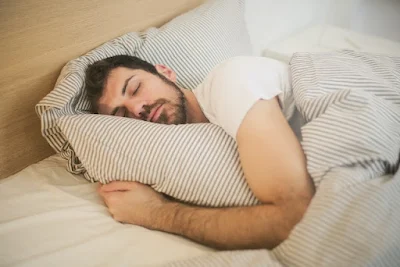25 Habits For Better Sleep and Improved Energy
Introduction
Getting enough high-quality sleep is essential for energy,
focus, productivity, and overall health. Unfortunately, many people struggle to
get the recommended 7-9 hours of sleep per night. Developing habits that
promote better sleep hygiene can help you fall asleep faster, sleep more
soundly, and wake up feeling refreshed and energized.
25 Habits For Better
Sleep
1.
Stick to a sleep schedule
Going to bed and waking up at the same time each day regulates
your circadian rhythm so you can fall asleep and wake up more easily.
2.
Develop a relaxing bedtime routine
Having a consistent wind-down routine like reading or meditating
signals to your body it's time to sleep.
3.
Limit daytime naps
While short power naps can boost energy, long or late naps can
make it harder to sleep at night.
4.
Exercise regularly
Moderate exercise during the day helps promote better sleep,
while vigorous exercise too close to bedtime can interfere.
5. Be
exposed to bright light in the morning
Exposure to sunlight or bright light early in the day helps
synchronizes your body clock.
6.
Limit caffeine late in the day
Caffeine can stay in your system for 8-14 hours. Avoid coffee,
tea, soda and energy drinks late in the day.
7.
Avoid large meals before bedtime
A light snack is okay, but eating too much close to bedtime can
lead to indigestion that interferes with sleep.
8.
Limit alcohol before bed
While a nightcap may help you fall asleep, it causes sleep
disruptions later in the night.
9. Stop
smoking or using nicotine
Nicotine is a stimulant that leads to lighter, less restful
sleep.
10. Get
comfortable
Set your bedroom at a comfortable temperature between 60-75°F
and use comfortable bedding for better sleep.
11.
Block out excess noise
Use a sound machine, earplugs or a fan to help drowned out
noises that can disrupt sleep.
12.
Control bedroom light
Minimize outside light with blackout curtains and eliminate
disruptive electronics lights.
13.
Practice relaxation techniques
Meditation, deep breathing and mindfulness help reduce stress
and anxiety before bed.
14.
Clear your mind
Jot down worries on paper and set them aside so they don't keep
you up at night.
15. Go
to bed when sleepy
Only try to fall asleep when you actually feel tired to avoid
tossing and turning.
16. Get
out of bed if you can't sleep
If you haven't fallen asleep after 20 minutes, get up and try a
relaxing activity until you feel sleepy.
17.
Establish daytime rituals
Having set morning routines and work rituals help program a body
clock.
18.
Expose yourself to daylight within an hour of waking
Light exposure early in your workday keeps your circadian rhythm
on track.
19.
Don't look at screens before bed
The blue light from TV, laptop and phone screens suppresses
melatonin production.
20.
Eliminate distractions
Keep your bedroom dark, cool and quiet with a comfortable
mattress for better sleep.
21.
Exercise your mind
Read a book or listen to soothing music to help redirect worries
and relax your body.
22.
Write down a to-do list
Getting thoughts and plans out of your head and onto paper can
prevent mental distractions.
23.
Limit fluid intake before bedtime
Reduce the need for bathroom trips by limiting liquid intake 2-3
hours before bed.
24.
Take a warm bath
A warm bath 1-2 hours before bed relaxes muscles and eases the
transition to sleep.
25.
Talk to your doctor
Discuss your sleep issues with your doctor to identify any underlying
causes or medications that affect sleep.
Conclusion
Making small, consistent changes to your daily habits and
bedtime routine can have a profound impact on improving your sleep quality and
energy level. Start with just a few of these science-backed tips and build
momentum by adding more good sleep hygiene habits over time. With commitment
and consistency, you can optimize your sleep and wake up feeling more refreshed
and energized every day.
Frequently Asked
Questions
What
are some foods and drinks that can help promote sleep?
Foods like nuts, fatty fish, chamomile tea, tart cherry juice,
and kiwi can help improve sleep due to compounds and hormones they contain that
promote relaxation and sleep. Avoid spicy foods, heavy meals, and caffeine at
night.
How
much sleep do adults need for optimal health?
Most adults need 7-9 hours of sleep per night. Getting less than
7 hours regularly is associated with a range of negative health outcomes.
What
causes insomnia?
Insomnia can be caused by mental health disorders like
depression and anxiety, medications, chronic pain or discomfort, stress,
hormonal changes, poor sleep habits, and more. See a doctor if insomnia
persists.
How can
I relax my body and mind before bed?
Practicing relaxation techniques like deep breathing,
progressive muscle relaxation, guided imagery, and mindfulness meditation can
help calm your body and mind before bed.
What
should I do if I'm tossing and turning and unable to fall asleep?
If you can't fall asleep within 20 minutes, get out of bed and
engage in a relaxing, non-stimulating activity until you feel sleepy, then
return to bed and try again.

